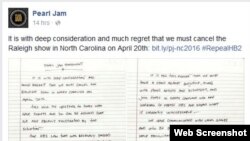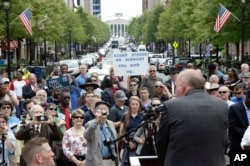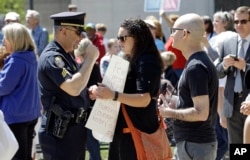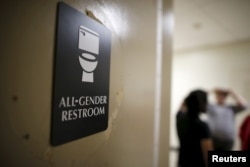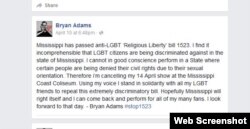The battle over lesbian, gay and transgender rights continued Tuesday when a U.S. Appeals Court ruled a Virginia school's banning of a transgender student from the boy's bathroom is discriminatory.
The 4th Circuit Appeals Court referenced the U.S. Department of Education's bathroom policy that says use of sex-segregated facilities should be "determined by reference to the student's gender identity." The ruling will allow high school student Gavin Grimm to move forward with a lawsuit he filed last year.
In North Carolina, boycotts of the state's "bathroom bill" law continued this week with the cancellation of concerts by two popular rock bands scheduled to play in the state.
Pearl Jam canceled an April 20 concert with a statement on its website Monday, saying the law was "a despicable piece of legislation that encourages discrimination against an entire group of American citizens."
The rock group Boston also canceled three planned concerts in North Carolina with an announcement on their Facebook page Monday.
Last week, North Carolina Governor Pat McCrory responded to intense criticism over the state's legislation, signing an executive order that alters key provisions in the measure but leaves in place its most controversial elements.
The executive order allows private businesses in the state to establish their own policies regarding the use of bathrooms and locker rooms by transgender people and restores some of the equal opportunity employment policies and rights to sue for discrimination.
Controversial part of law
The order signed last week does not change the most controversial part of the law, which stipulates that bathrooms and locker rooms in public schools, agencies and universities must be designated for use only by people based on their biological sex at birth.
Transgender people would only be entitled to use bathroom facilities matching their preferred gender identity if they have had their birth certificates legally changed to reflect their transition from male to female or the reverse.
McCrory signed the legislation into law last month.
The move comes as the debate in the United States over differences between religious beliefs and individual rights shows no signs of flagging. Laws seen as undermining LGBT rights in several Southern states have sparked protests and boycott threats from businesses and entertainers, as well as counterdemonstrations by conservatives.
Hundreds of people gathered last week in Raleigh, North Carolina, near the governor's offices, to support the bill.
Signs declaring "No men in women's bathrooms" emphasize a point in the new law that has drawn wide support among state residents who hold conservative political views.
A smaller crowd of about 100 people staged a counterprotest. Their chants — “Bigotry is bad for business", "They are preaching hate!" and "They don’t represent our state!" — were drowned out by the larger group opposed to extending equal rights protections to people who are transgender, according to The Associated Press.
Opponents of N.C. law
Democratic presidential candidate Hillary Clinton called the law “shameful,” and a number of high-profile businesses — including Apple and American Airlines — are threatening to withdraw from the state.
Rock music legend Bruce Springsteen, who canceled a planned North Carolina concert, posted a message on his website: "Some things are more important than a rock show, and this fight against prejudice and bigotry — which is happening as I write — is one of them."
Many businesses have criticized the law, but few have taken specific action to underscore their disagreement with the state over the issue.
The National Basketball Association and the National Collegiate Athletic Association (NCAA), which had been considering moving sporting events out of the state as a protest, have since decided they will not change venues.
The North Carolina NAACP has threatened civil disobedience if the state legislature does not act to repeal the law when it comes back into session April 25.
Mark Creech of the Christian Action League told the crowd in Raleigh that his organization plans to rally in support of the law when the legislature reconvenes.
Creech denounced "a smear campaign [that] has resulted in unfounded criticism of the law.”
Principles vs. religious beliefs
North Carolina's “bathroom bill” is just one of many initiatives in states across the U.S. South that some say would deny equal rights protections to gays, lesbians and transgender people (LGBT) on the grounds that this would protect other individuals’ religious beliefs.
In Mississippi, protests greeted a law signed by Governor Phil Bryant allowing business owners in Mississippi to refuse service to same-sex couples.
It also would allow employers to determine workplace policies based on their religious beliefs.
“It’s not discriminating against anyone. People around the country may be overreacting to it,” the Republican governor said. “They need to read the bill and understand that people of faith have some rights as well in this country.”
A Mississippi state lawmaker, Jay Hughes, said last week that he intends to try to get the law repealed through another proposed bill he is sponsoring, "the Mississippi Economic and Tourism Recovery Act.”
“Mississippi has been here before,” Hughes wrote in a post on his Facebook page. “We must give reasonable minds and the principles of democracy an opportunity to be heard. Repeal [the bill]. All Mississippians are equal.”
Canadian musician Bryan Adams, who canceled a planned show in Mississippi last week as a protest, wrote on his Facebook page, “I cannot in good conscience perform in a state where certain people are being denied their civil rights due to their sexual orientation.”
Ninety-five prominent writers, including winners of the National Book Award and the Pulitzer Prize and a former national poet laureate, wrote in an open letter of protest that the law known as House Bill 1523 does not reflect Mississippi's compassionate nature.
“This core kindness, this embracing of wildness and weirdness, is what has nurtured the great literature that has come from our state,” they wrote.
The Tennessee Legislature passed a bill last week that would allow mental health professionals to deny services based on their religious beliefs or “sincerely held principles.”
'Unheard of concept'
Democratic State Senator Jeff Yarbo said denying services based on religious beliefs has legal precedents, but similar exclusions for those with "sincerely held principles" is irregular, "an unheard of concept.”
On the other side of the issue, Republican State Senator Richard Briggs, a physician from the city of Knoxville, defended the bill.
“If someone comes to me and says, ‘I want an abortion,’" Briggs asked, "should I have to do that if it’s against my principles and I don’t believe [in abortion rights]?”
Tennessee Governor Bill Haslam said he will review the final text of the bill before deciding whether to sign it into law.
Earlier this month, the Tennessee Legislature also moved for a second time to designate the Bible the official state book. The bill is widely perceived as a violation of the separation between church and state as enshrined in the First Amendment of the U.S. Constitution.
